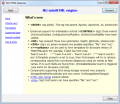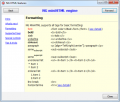LMD NG 2014 - News
<< Back to Getting started page
Contents
General
The new Next Generation (NG) Control Suite supplements the LMD line of products for Embarcadeo Delphi/C++Builder. While LMD VCL products still (now and in the future) support legacy IDEs (Delphi/C++Builder 6 and higher), NG components make use of new IDE and language features of most recent IDE releases (Delphi/C++Builder 2009 and above). This way allows us to neglect compatibility issues (e.g. Unicode and Generics support) and to use ideas which are not possible with older IDEs.
Besides that NG Controls are designed to be lightweight and task-focused. They do not represent a complete framework like the LMD VCL platform and can be used at the same time with LMD VCL controls, the VCL (and later FMX) or any other 3rd Party toolbox.
[Top]
Support for IDEs and operating systems
- Compatible with Delphi and C++ Builder XE2, including 64bit support for XE2 and higher! The next Delphi/C++Builder release will be support almost immediately after public availability.
- Supported IDEs
- Delphi 2009, 2010, XE, XE2 (depending on package)
- C++ Builder 2009, 2010, XE, XE2 (depending on package)
- All corresponding Studio Products (CRS 2009, RAD Studio 2010, XE, XE2 etc.)
- Supported operating systems
- Win 2000 or better (including Windows 7 + 8).
In release 1.X (2013) VCL only is (actively) supported. However for all pacckages support of FMX is in preparation (exceptions are e.g. windows only related features like the native TaskDialog implementation).
64bit support (Delphi XE2 and higher)
All packages are available in 64bit versions.
[Top]
NG Serialization Pack (XE and higher only)
NG Serialization pack provides the ability to serialize/de-serialize Delphi objects into various storage formats. This allows to write data handling applications more easily and in more object oriented way. NG Serialization Pack uses enhanced RTTI features and supports latest features of Delphi/C++Builder runtime (like e.g. Generics). Common use cases of a serialization engine are:
- Saving/loading application options / configuration data which are represented by typed objects.
- Sending business objects via net between client and server.
- Saving/loading CAD-like application documents, since they are usually represented at runtime in a tree-like object model.
- ect.
See also: NG Serialization Guide
Demos
Demo folder: serialization\delphi
serialization
A very extensive demo project which demonstrates a common use of NG Serialization Pack: Transmitting business objects between client and server applications. An extensive object model is created and usage of many supported attributes and creation of converter classes are demonstrated.
simple
Simple demo which demonstrates simplicity of (de-)serializing generic TObject and TObjectList descendants from/to XML files.
[Top]
NG HTMLPack
A set of lightweight controls for HTML display (supporting a subset of HTML tags). Advanced functionality like support of variables, internal controls, DB templates, images etc. is included.
Click on images below for more info.
Controls
- Non-DB Controls
- TNGHTMLLabel
- TNGHTMLHeaderControl
- TNGHTMLListBox
- TNGHTMLPanel
- TNGHTMLView
- TNGHTMLStringStorage
- DB Controls
- TNGHTMLDBLabel
- TNGHTMLDBView
Demos
Demo folder: html\delphi
features
Demonstrates features of the NG HTML engine.
controls\core
Demonstrates non-DB aware controls of NG HTMLPack.
controls\dbaware
[Top]
NG DialogPack
This package will include standard TaskDialog implementations + several advanced dialog types with extended features.
[Top]
NG ValidatorPack
LMD Validators Pack provides a set of components and classes to implement client-side validation of data input in an elegant and clear way without writing much code (often without any code at all). The two main tasks of client-side validation are:
- to check for validity a value entered by a user into some input control;
- to provide feedback about validation results (e.g. to indicate an error) in some way.
NG ValidatorPack represents the standalone version of LMD Validator Controls without any references to LMD VCL - usable with many available VCL and 4rd Party input controls.
For first info check LMD Validator Tutorial (LMD VCL related, but concept is same.
[Top]


